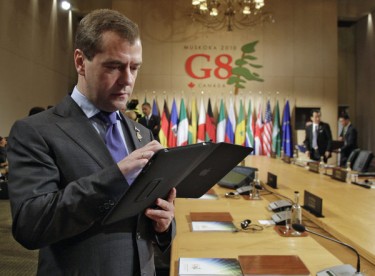It all started with a tweet.
“Hello everyone! I'm on Twitter, and this is my first tweet,” wrote Dmitry Medvedev during a visit to Twitter headquarters in Silicon Valley on June 23, 2010. The Russian president created two official Twitter accounts – one in Russian and one in English – in a publicity tour that made headlines around the world. With 2010 coming to a close, we take a look back on some of the highlights of the president's first six months on Twitter.
It was a brilliant public relations play that complemented the President's other efforts to capture opportunities offered by social networking and new media. Within minutes, Medvedev's Twitter account attracted some 1000+ followers. People on RuNet (the Russian internet) responded with intense interest and a flurry of comments and reactions. In the six months that followed, Medvedev successfully managed to engage 147,295 followers on his Russian Twitter account by posting photos, links to news, and even some personal commentary.

View of San Francisco from Medvedev's hotel room. Shared on Twitpic on June 23, 2010. Photo by Dmitry Medvedev
The presidential Twitpic profile deserves special mention as Medvedev often demonstrates his tech-savviness by sharing pictures he takes with his iPhone. Apple should almost be paying him for the publicity.

President Medvedev's fondness of Apple products is obvious, pictured here with an iPad at G8 Summit in Canada in June, 2010.
It was also a great public diplomacy effort, as Medvedev's English-language Twitter account – aimed at foreign audiences – attracted 61,451 followers and provided for quite some discussions over the coming months in the global public sphere that is Twitter. As noted in June by a popular Russian television host and blogger, Tina Kandelaki [RU]:
“If he continues putting up such photos, like the ones after his Twitter registration, the Russian authorities will have a real chance of becoming authorities of which their people are proud. […] If he continues being as active as he was at the beginning, the emergence of “New” Russia will become apparent not only in Russia, but also in the West.”
The President vs. The Kremlin
The fact that the President was initially using @KremlinRussia and @KremlinRussia_E (E for English) as his personal Twitter profiles raised some controversy on the blurring of the lines between Medvedev and the official Kremlin. So on November 19, 2010 two new Twitter profiles were created, also called @KremlinRussia and @KremlinRussia_E while the original ones were renamed @MedvedevRussia and @MedvedevRussiaE.
According to RIA Novosti, the president is tweeting himself on the new account. Apparently, he wished to enjoy more informal communication with his followers. Meanwhile, @KremlinRussia and @KremlinRussia_E represent “official Kremlin news,” as stated in the new profile descriptions. Ironically, @KremlinRussia now only has 10,731 followers and @KremlinRussia_E only 2,193 because the followers remained on the old accounts.
Another rival in this space is the mock Kremlin tweeter @KermlinRussia (note the spelling error) who has close to 52,500 followers and ranks 4th among the most followed Russian tweeters (funnily enough, according to the latest stats from Twirus, @MedvedevRussia is the top “RU Popular Tweep”, as of December 14). The mock tweeter, identifies himself as the “Perzident” of made-up country “Roissya”.
Unfortunately, no translation can capture the brilliant play of words in the profile description. Intentional misspellings that would otherwise mean “Russia, Forward!” and “Official Twitter account of the Russian President” evoke negative associations. For instance, “Russia, Forward!” is a nod to a notorious article by Medvedev in September 2009 calling for modernization and innovation in Russia. Yet, the way it is misspelled (Роисся вперде), it sounds more like “Roissya is screwed.” When Medvedev's Twitter account was renamed, @KermlinRussia did not pass on the opportunity to comment in a series of tweets on the same day [RU]:
Good bye to all who are now with @MedvedevRussia. Hello to all who would never confuse our profiles in the first place.
Best business practices: Just a while ago 122,000 followers were transferred from an official state account to a private one. Doesn't this remind you of anything?
@KermlinRussia is just one among the increasingly prolific mock tweeters in the Russian Tweet-o-sphere, which features mock feeds @PremierRussia (fake Vladimir Putin) and @Kremlins_wife, but also by the great Russian poet @Alex_Pushkin (1799-1837) and @NikolayII, the last Russian Czar Nicholas II (1868-1918). (My personal favorite is the “Kremlin worm” – @KremlinCherv – who gained prominence after an embarrassing incident in October).
While the Twitter humor is prolific, the satire has also affected wider public political discourse. The misspelled phrase Роисся вперде (“Roissya is screwed”) has become the title of an upcoming book by Oleg Kashin, a reporter for Kommersant who was badly beaten in November. The book, which is expected to be released at the end of December, is a fictional story about the land of “Roissya” and is an anti-Utopian account of a society with modernization as its ideology. You can find excerpts from the book in Russian here.
@MedvedevRussia are you listening?
Early in his tweeting days, President Medvedev was mostly self-referential. Although he established a presence on Twitter, Medvedev (and his PR team) did not seem to grasp the two-way nature of social networking. On the contrary, the presidential Twitpic profile, for instance, was heavily moderated within a day of being launched. After a few controversial remarks and questions, all the comments beneath the photos suddenly disappeared. As Gregory Asmolov remarked on Global Voices, “The era of the Russian unmoderated online democracy lasted less than 24 hours.”
Things improved a bit later in fall, when the president (or at least the people behind his profile) apparently noticed the “@Mentions” and “Reply” buttons on Twitter, and started being more responsive. On September 14, Medvedev celebrated his 45th birthday, and congratulations via Twitter poured in by the hundreds. The president duly acknowledged all those who wrote in, and thanked them for their wishes.
Several more interactions followed that made it to domestic and foreign news reports, including one on October 2, which asked whether @KremlinRussia was “real”, and received a personal response from the President. Some were birthday-related, while others – more recently – focused on the Belarusian elections. On November 24, venting his frustration over various issues in the country, @garipov_radik tweeted:
@MedvedevRussia Dm. Anatolievich! Are you reading our tweets at all? Or are we talking to the hand, here? We are, after all, discussing subjects that are important to us. Respond now.
And the response came:
@garipov_radik I am reading. Thanks for all the suggestions to all of you who write to @MedvedevRussia. I am thinking of using some of these ideas in my address to the Fed. Assembly.
Did he? Here's a tweet from @garipov_radik from November 30, the day of the annual speech at the Russian Federal Assembly:
@MedvedevRussia Watched the address with the whole family. Were happy to hear my suggestion about the FREE provision of land to families with (many) children. Great!
I was unable to find any other tweets to suggest that more ideas from Twitter have been adopted in this speech or others. However, the example above does show that beyond gaining purely technical skills, Medvedev is also improving his communication strategy as a whole.
On November 30, an Armenian news website picked up a story on how a woman with an Armenian-sounding surname had received a response from the Russian president on Twittter.
Dreamt of @MedvedevRussia today. were having dinner in some dark castle. were talking about Twitter. yeah right…
@inna_smbatyan I did not have dinner at all yesterday. Was preparing the address :)
The president's new responsiveness to citizens shows the potential for major transformation in communication for both public relations and public diplomacy purposes. After all, if Holywood actor Ashton Kutcher can, why can't he? (Twitter has been embraced by many politicians and officials in Russia, as well as around the world. According to the Wall Street Journal, there are 62 international leaders officially on Twitter, perhaps most notorious among them Venezuela's Hugo Chavez and North Korea's Kim Jong Il.)
Medvedev, who now has four Twitter accounts, is obviously good with iPhone and Twitpic sharing, and even learned how to use the “Reply” button. A good start for the first six months on Twitter? Perhaps. We will have to wait to see whether any substantive action follows his virtual words. At the end of the day, that is what really matters.
On recent violent clashes in central Moscow, where thousands of nationalist soccer hooligans shouted racist epithets, Medvedev tweeted warnings to the perpetrators:
И последнее – на сегодня. По Манежной. В стране и в Москве – все под контролем. Со всеми, кто гадил, разберемся. Со всеми. Не сомневайтесь.
He also retweeted two posts from the official @KremlinRussia feed with links to official statements from Kremlin, highlighting the need for discipline and calling for the punishment of those who incited “criminal acts”. The racist responses on Twitter have been fierce.
Will each of the thousands of perpetrators really be prosecuted? Yet, on Twitter, Medvedev seems to appear more like any other citizen, voicing frustration at something he perhaps has limited power to change for the better.










7 comments
Yelena, This is really one of your best & most informative pieces. I hope it gets wide distribution. Bravo! John
Thank you! I should say it owes much to my GVO editors, too! :-)
Great piece. I found the part about switching from a Kremlin account to a personal account really interesting. Good to know that even world leaders struggle with professional versus the private brand distinction! Agree with John Brown above — I hope this piece gets wide distribution; it deserves it.
Great and insightful post! Thanks, Lena.
I’d like to add that 79,074 people “like” social media savvy Medvedev on Facebook.
@Amy – thank you. I hope so too! I’m still waiting (and hoping) for a response from @MedvedevRussia himself! :)
@Katya – indeed. In fact I read somewhere that his profile is among the top most “liked” groups in the Russian facebook-sphere. However, I can guarantee that the profile is recent too – since it wasn’t there last March/April. Will consider doing further research about on that. However, the excitement about the Twitter account is that he’s tweeting himself – in person – while most of the info put on Facebook is obviously from the “@KremlinRussia” team :-) Would appreciate any insights/observations/information you might have in this regard!
I noticed recently that Medvedev seems to have re-enabled the comment function on his Twitpic account. There are over 250 comments on this recent post of a photo of an Elton John concert (http://twitpic.com/3fd0yt). I haven’t examined the comments in great detail, but they don’t look as if they have been heavily moderated. Not sure exactly when he did this, but there are comments on pictures going back at least three months.